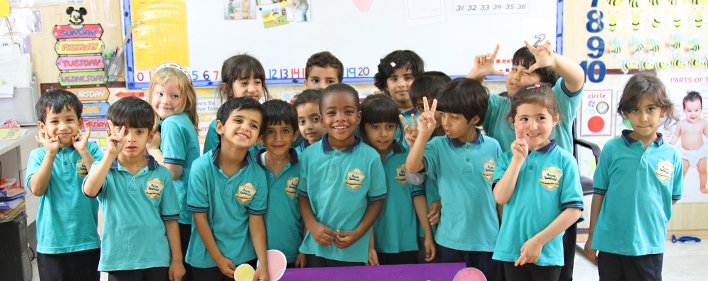Academic Overview

Our academic program is standing on three pillars –
- Quality Curriculum
- Quality Teachers
- Quality Testing
And THEREFORE WE have QUALITY RESULTS!
All Omani students follow the Arabic, Islamic and Social Studies curriculum up to Grade 12, together with an English-based curriculum. Expatriate students follow the English curriculum and have relevant options regarding Arabic and Islamic.
In Foundation Stage 1 & 2 the method of “Playing and Learning” eventually prepares our students for Grade 1. In Grade 1 they learn to read, write and speak English, by following the official Cambridge Curriculum. There is a saying, “The students learn to read and write up to Grade 2, and thereafter they read and write to learn.”
In Grade 6 the students write the Cambridge international examination, in English, Mathematics and Science. They will continue to follow the Cambridge-based curriculum up to Grade 10, when they will select their subjects for Grades 11 and 12. All students finish school at the end of Grade 12 with the final national examination. This final certificate will allow them to further their studies anywhere in the world at colleges, universities or tertiary institutions.
Arabic, Islamic and Social Studies (ijtima’iyyaht) are taught throughout. These subjects are compulsory for Omani students and optional for non-Omani students.
The main medium of teaching in English will be in the following subjects:
- English
- English Reading
- Mathematics
- Science
- Social Studies (Expats),
- Information Technology (IT)
- PE
- Art
The main medium of teaching in Arabic will be in the following subjects :
- Arabic
- Islamic
- Social Studies (ijtima’iyyaht)
Additional subjects will be :
- Basic Arabic
- Basic Islamic
- French or Spanish
- English Applications
TESTING / ASSESSMENTS
Throughout Foundation Stage up to Grade 2 the final marks will be based on continuous assessment. In Grade 3 “formal tests” will be introduced (informally) and from Grade 4 the marks will be a combination between assessments and examinations (formal tests).
Our assessments could be seen as three connected levels: short term or day-to-day assessments which are an informal part of every lesson; medium term assessments which are used to review and record the progress learners are making over time (each Term) in relation to the key outcomes; and long-term assessments which are used at the end of the school phase in order to track progress and attainment against school and external targets.
TAWAM INTERNATIONAL SCHOOL will use continuous assessment to determine, to a large extent, the amount of progress made by students. Each phase of the school will be addressed separately, and criteria set for continuous assessment.
In the Foundation Stage up to Grade 3 continuous assessments throughout the academic year will form the total and final mark on the academic reports.
Thereafter, from Grade 4 continuous assessment combined with more formal end of unit testing (or examinations) are employed to ascertain whether a student has reached a level of performance suitable for advancement to the next grade.
It is essential at all levels of the School that an accurate record of marks and assessments are kept to justify the teacher’s decision regarding the student’s progress. Properly set out “Mark Books” or “Assessment Records” are being kept. It will be the responsibility of every Head Teacher to check and to ensure that continuous assessment is being introduced, that work is being assessed continually (and not just in a rush in the end!) and that accurate and neat records are being kept of marks.
Finally these marks / comments will be available and be used on reports at the end of every term and at the end of every academic year.
CONCLUSION
Ultimately the English Curriculum is followed up to Grade 12 and therefore English will be the medium of teaching from Foundation Stage 1.
Omani Students (and Arabic-speaking students) will also receive Arabic and Islamic in their native language (Arabic)
The ultimate aim is to have all students prepared, able and capable to understand English well enough so that they could fully concentrate on the curriculum requirements of each of the following academic years.
Therefore, already from FS 1, it will be the essential task of teachers to prepare, train and equip all students to be able to read, write and speak English in such a way that by the time they reach Grade 2, they will be able to “read and write to learn!”
PRIORITY
The first and most important aspect of schooling is to concentrate on the academic status, the quality of teaching and the functioning of all subjects and classes. All teachers must fully follow the prescribed curriculum and have proper academic records and information of their students available at all times.
Therefore it is essential that –
- the required curriculum(s) will be followed and completed;
- continuous assessments (thorough checking and testing of standards) will be done;
- qualified teaching staff will be appointed, monitored, trained, encouraged and equipped to provide quality and high standards of education;
- if and where necessary academic adjustments and even replacements will be considered to rectify and/or improve the standards of education (e.g. books, materials, equipment, facilities and staff)